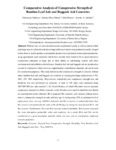Comparative Analysis of Compressive Strength of Bamboo Leaf Ash and Baggash Ash Concretes

View/
Date
2019-04Author
Onikeku, Oluwaseye
Shitote, Stanley Muse
Mwero, John
Adedeji, Adeola. A.
Metadata
Show full item recordAbstract
Billions tons of conventional concrete are produced yearly as well as cement which
emit large tons of carbon dioxide due to huge millions of metric tons produced annually. Sequel
to this, there is need to produce a sustainable product due to pollutions from cement production,
using agricultural waste materials which have recently been found to be of great interest to
construction industries at large due to their ability to substituting cement will solve
environmental and pollution related issues. Bamboo leaf ash and baggash ash are produced as
a result of combustion which serves as supplementary cementitious materials and can be used
for construction purposes. This study determines the compressive strength of concrete without
ashes, bamboo leaf ash, and baggash ash concrete at varying percentage replacement of 5%,
10%, 15%, 20% respectively. Physical test, workability test, compressive strength test, and
durability test was performed on concretes. A total of 138 cubes were produced using
100*100*100 size cube cured at 7, 28, 56 and 90 days, of which 108 cubes were to ascertain
compressive strength for all the concretes, while 30 cubes were used for durability test. Based
on experimental results obtained, BLA surpassed BA concrete, and concrete without ash in
term of compressive strength at early and later age of curing using 10% as optimum level of
replacement, thus, one way ANOVA indicated, that BLA concrete is statistically better than
BA concrete and statistically the same at 56 and 90 days of curing for conventional, BLA, and
BA concrete. Furthermore, BLA and BA concretes reduced durability. BA concrete increased
the water absorption, permeable voids, and sorptivity. As a result, BLA and BA can be
considered as a good pozzolanic material which can save cost of construction, improved
concrete properties
